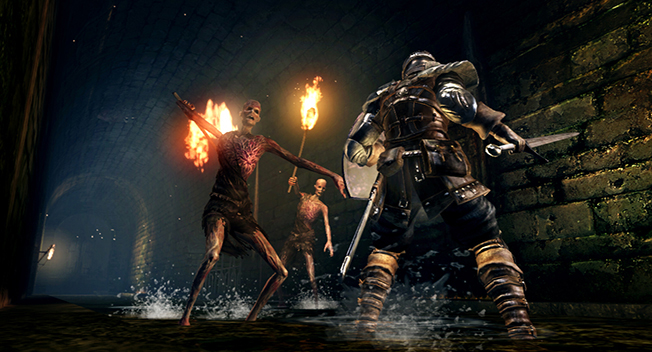Just what specifically is the ever elusive challenge that MMO gamers seek out? For some it’s the allure that comes with defeating the hardest of foes and claiming the glory that’s associated with it, while for others it’s crafting that one rare item made out of materials forged in a dying star. Whatever the case, it seems as if there’s no true solution for what everyone wants despite companies best attempts at trying to cater to as wide a market as possible. Is this a self-depreciating irony or are we just becoming too picky?
Difficulty and challenge is largely subjective, though there are also some clear-cut standards for what can be attributed to as difficult. A very challenging boss fight with a short enrage timer (the time from the start to an artificial time limit, unique to each boss generally, at which point the boss does in order of magnitudes more damage to kill everyone purposefully) could be deemed hard, but that’s only surface level. What about the actual mechanics and elements that compose the fight? Is there a lot of outgoing damage (damage from the enemies to the party) that requires everyone to be perfect in order to take as little as possible? Or are there very hard-hitting enemies that push damage dealers to their limit in order to kill them fast enough?
In both of these cases, depending on the individual, either or could be more difficult for them, while the other proves to be easy. Developers try to mix in as many different mechanics through their end game content as they can in order to provide obstacles for the players to overcome that aren’t all identical. The trend now though is to have very easy content pepper the leveling experience, while the true game begins upon reaching the game’s level cap. Sure, it’s nice to ease in players with content that doesn’t make them quit the game in anger or frustration, but too much can leave them bewildered and overwhelmed when complex game design is hurled at them from every angle.
Some games have end game dungeons that are supposed to be used as a stepping-stone between the easy leveling ones and the hard mode, or “heroic” dungeons (which are usually end game versions of the ones they did while leveling, completely retuned for higher levels). What usually ends up happening though is players completely skip the ones meant for practice and learning, and go straight in for the challenge. Consequently, newer players feel pressured into going down that route, but become burdened with the increase in difficulty in contrast to their game knowledge.
Having separate difficulties of end game content also segregates the player base, with those without as much time as others feeling left out or cheated by their inability to obtain the best gear. They pay the same monthly fee (or what have you) as the next person, but they don’t have as much time. This is another factor developers have to consider now, with the current trend of game design and the multitude of other games available, a reason must be provided for why their game is better than the next.
What if that’s not your focus though? After all, in the real world we don’t go around fighting everybody we see while completing tasks. Some gamers play online games for the social, exploration, crafting, story or player vs player aspects.
For these people, the choices are much narrower. Generally they represent either a smaller population, or a much quieter one (or both!). Crafting is a tricky beast to balance, since the more vocal population (and current trends) lean towards wanting the best items to drop from raids and dungeons instead of being crafted by players. This doesn’t help alleviate the feeling of professions being worthless, since there’s no clear point to spending time and money leveling them. At most, they can make some money selling leveling equipment or consumable items, but that’s an unsatisfying use of time for those who love to craft, outside of doing it to accumulate wealth. To solve this, some games have made it a minigame of sorts (Everquest 2), or a whole other class with its own gear and abilities (Final Fantasy XIV) – these two MMOs are by no means the only ones, but are simply better known. Conversely, those who don’t enjoy it but craft anyway to obtain items for their character, or to sell things, will be put off by the artificial barriers in place.
Player vs Player is another facet that isn’t usually focused on, and when it is, falls from grace awfully fast. Warhammer Online, now shut down, is an example of this. Released in 2008 by the same development team behind Dark Age of Camelot (a much beloved PvP game), the game amassed a wealth of hype, but plummeted from grace soon after launch despite it having a PvP focus. It’s difficult to balance classes against one another, for both 1 vs 1 and group encounters, but doing so can lead to repercussions in Player vs Environment (PvE, meaning dungeons, leveling, etc.) and upset the balance there. Those who only enjoy battlegrounds and arenas are a smaller bunch than those who enjoy fighting through dungeons, so it’s a more niche market.
Difficulty and Challenge cannot be found for every player in every game, but certain adjustments can and should be made to increase longevity. Having things simple helps in the short run, but MMOs aren’t games made to be left aside after a short while. They’re designed for you to enjoy for months to come, and adding layers of complexity and depth, could satiate the ever present longing for something better that gamers tend to have.
Enjoy this article? Then why not sign up to Fortitude Magazine’s Weekly Round Up! Our pick of the week’s best news, reviews, videos and music straight to your inbox. Click here to sign up today!

